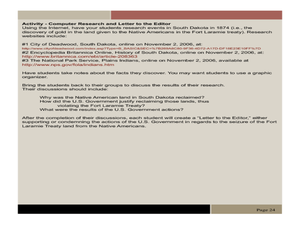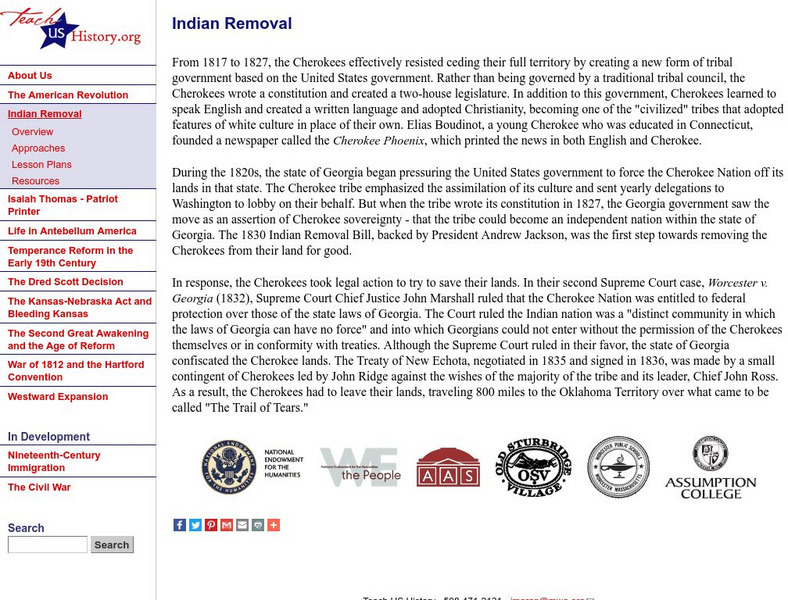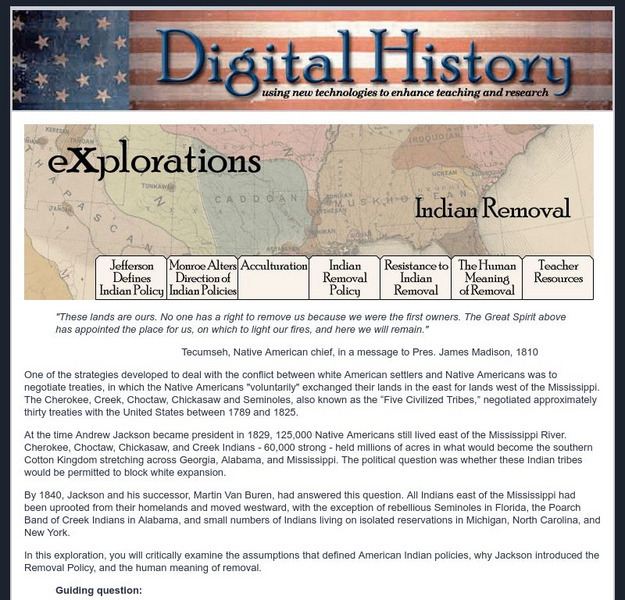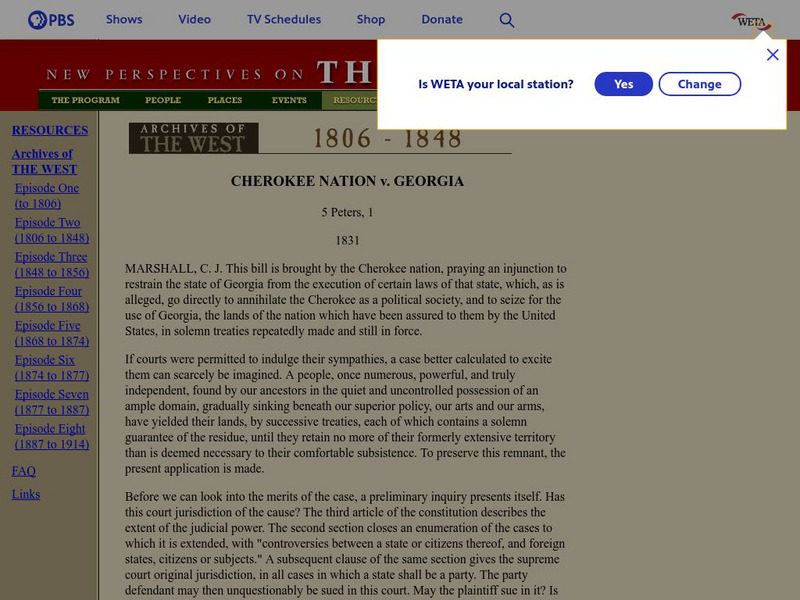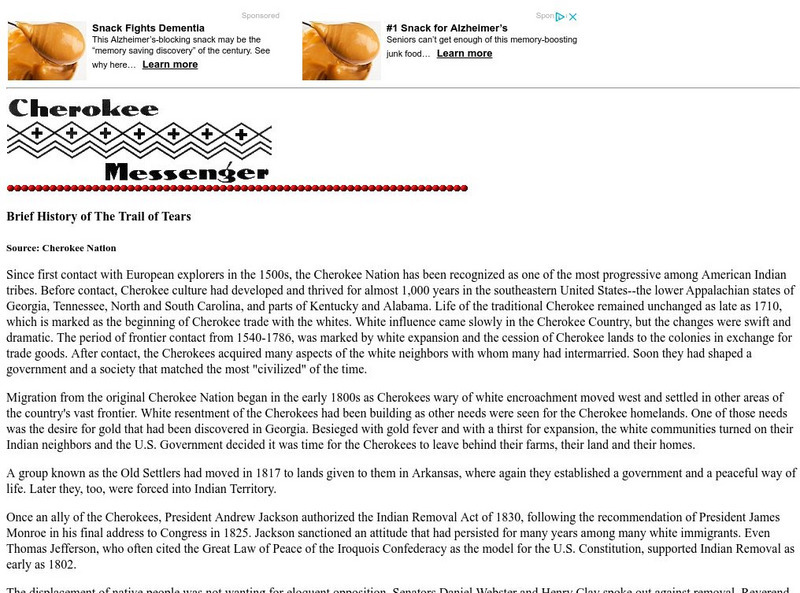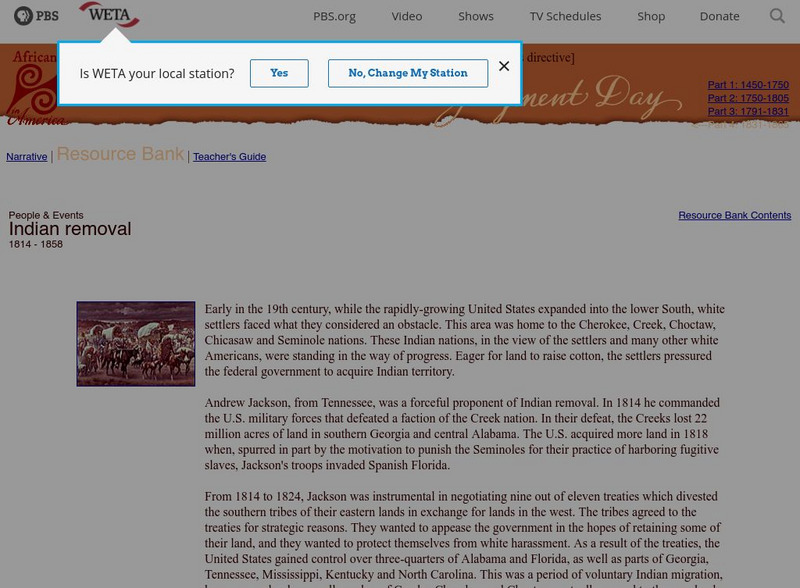Thoughtful Learning
Using Perspective Shifting to Imagine History
Imagine what it would have been like to walk from Georgia to Texas! Perspective shifting, a key part of developing social awareness, involves just this sort of imaging. A short mini-lesson asks learners to shift their point of view and...
Curated OER
Native Lands: Indians in Georgia , Losing Ground: Removal, 1802-1838
Students investigate the removal of the Creek Indians from Georgia. Students read the story of the Creek removal from Georgia, locate sites mentioned on a map, and create a related timeline. Students share their thoughts on the Creek...
Curated OER
Indian Removal
Fourth graders read The Trail of Tears and create a timeline to show the sequence of events that effected the Native American tribes during Andrew Jackson's presidency. In this Native American lesson plan, 4th graders discuss the...
State Bar of Texas
Worcester v. Georgia
Can the president of the United States defy the rulings of the Supreme Court? Students investigate the case of Worcester v. Georgia and the impact it had on society and, most importantly, Native Americans. Using a short video clip as...
Curated OER
Andrew Jackson and the Trail of Tears
Students examine the three historical portraits Andrew Jackson, iam Pitt and Portrait of a Boy for symbolism. They research Andrew Jackson's involvement in the Cherokee Indians' Trail of Tears in North Carolina, and compose a portrait.
Curated OER
Stop Action and Assess Alternatives
Students stop action and determine how history may have been altered. In this historical perspectives lesson, students consider how the Cherokee Removal, the Transcontinental Railroad, the Immigration Act of 1924, and the dropping of the...
Curated OER
The Trail of Tears; Its Grief and Loss
Fifth graders are introduced to the removal of Native Americans along the Trail of Tears. In groups, they examine the political factors that caused this removal and its effect on society. To end the activity, they discuss various ways...
Curated OER
Trail of Tears
Pupils create a journal entry written from the perspective of a Cherokee, a soldier, or a person involved in the Trail of Tears.
Curated OER
Andrew Jackson
In this online interactive history worksheet, students respond to 6 short answer and essay questions about Andrew Jackson. Students may check some of their answers on the interactive worksheet.
Curated OER
This Land is my Land-Westward Expansion During Reconstruction
Students analyze policies regarding Native American territories during Westward Expansion. In this Reconstruction lesson, students research primary and secondary sources pertaining to the transfer of Native American land. Students take...
Curated OER
The Trail of Tears by Joseph Bruchac
For this Trail of Tears worksheet, students fill in the blanks with words given to the Trail of Tears. Students fill in 19 blanks on this worksheet.
Constitutional Rights Foundation
Constitutional Rights Foundation: Indian Removal: The Cherokees, Jackson, and the "Trail of Tears"
Collaborative and consensus building activity on U.S. policy and treatment of Native Americans. Lesson provides an in-depth look at government Indian removal and provides a list from which students choose and defend a Native American...
US National Archives
Our Documents: President Andrew Jackson's Message, 'On Indian Removal'
Interactive image of the original document through which President Andrew Jackson called for "Indian Removal," in 1830. Includes transcription as well as background and overview of the text and results of the Indian Removal policy.
Other
Teach Us History: Indian Removal
A lesson plan unit that looks at the efforts of the Cherokee Nation in Georgia between 1817 and 1827 to establish their own system of governance and to keep their lands from being ceded. Even though the Supreme Court ultimately ruled in...
Lin and Don Donn
Mrdonn.org: Daily Life in Olden Times: Southeast Cherokee Indians
Lesson and resources on the history of the Cherokee Indian tribe.
Digital History
Digital History: Indian Removal
The Indian Removal policy was inhumane and without empathy for the Native Americans who were forced from their lands. Read about the attempts to enforce federal treaties and the final removal of three major tribes from the Southeast.
Digital History
Digital History: Explorations: Indian Removal
In this exploration, students will examine the federal policy toward American Indians, why President Jackson introduced the Indian Removal Policy, Native American resistance to removal, and the human meaning of removal.
PBS
Pbs the West: Cherokee Nation v. Georgia
The critically acclaimed PBS series, "The West," presents a copy of the order given by Chief Justice John Marshall when the bill to seize the Cherokee lands came to court.
Missouri State University
Delaware Town: Removal Era
Discussion of the removal of American Indians living east of the Mississippi River beginning in the late 1700s. Initially, these removals were voluntary, resulting from treaty negotiations. In 1830, Congress passed the Indian Removal...
PBS
Pbs Learning Media: Cherokee Nation: Virtual Field Trip
An in-depth look at the lives of the Cherokee Indians, from their first encounters with Europeans to events, such as the Gold Rush and the signing of the Indian Removal Act by Andrew Jackson, that led to their forced relocation to Indian...
Other
Cherokee Messenger: Brief History of the Trail of Tears
This website gives details about the events that led up to the displacement of the Cherokee Indians and the "Trail of Tears."
Other
Collector's Guide: Indian Territory: Phoenix Rising From the Trail of Tears
A discussion of the art forms preserved by the Native Americans who were resettled by the U.S. government in the Indian Territory.
PBS
Pbs: Indian Removal Andrew Jackson's Role
This site from PBS shows that Jackson was instrumental in the removal of the Cherokee population from Georgia and Florida. This site discusses his role in that policy. Links to related sites. Bibliography available at "Resource Bank" page.
Smithsonian Institution
Smithsonian: National Museum of the American Indian: The Removal Act
At first, the Trail of Tears only described the Cherokee removal of 1838. Later it included the removals of all southeastern Native nations. Take a close look at these primary sources from the Smithsonian which include a reproduction of...











